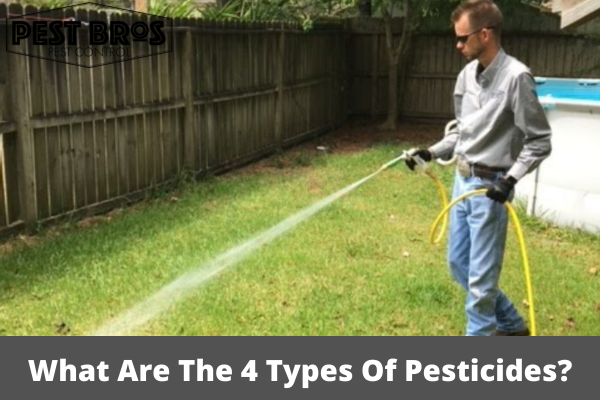

What Are The 4 Types Of Pesticides?
Pesticides are essential in modern agriculture and pest control, assisting in crop protection, pest management, and public health. They come in various forms, each tailored to target specific pests and achieve desired results. This blog will examine the 4 types of pesticides and their respective use. Understanding these categories can assist farmers, gardeners, and pest control experts make smart pesticide decisions that enhance effectiveness while limiting potential dangers.


Insecticides
Insecticides are further classified according to their mode of action. Contact insecticides, such as pyrethroids, kill insects by attacking their nervous system. They are widely used for quick-acting pest management, such as mosquitoes, flies, and cockroaches.
On the other hand, systemic insecticides are absorbed by plants and distributed throughout their tissues, making them efficient against pests like aphids and whiteflies that feed on plant sap. Neonicotinoids are frequently employed in agriculture because of their efficacy and broad-spectrum activity.
Systemic insecticides provide long-lasting protection by staying active within the plant even after application. However, they must be used cautiously to avoid harming pollinators and insects. Integrated Pest Management (IPM) approaches promote selective insecticides and alternative pest control strategies to lessen dependency on broad-spectrum insecticides.
Herbicides
Selective herbicides are intended to kill specific types of weeds while leaving attractive plants alone. They prevent the synthesis of particular plant enzymes or interfere with their growth hormones, unique to certain weed species. In agriculture, selective herbicides are routinely employed to limit weed competition and maximize crop yields. Selective herbicides include 2,4-D and dicamba, which target broadleaf weeds while having little effect on grasses.
Glyphosate and other non-selective herbicides are commonly used to control vegetation in non-crop areas such as sidewalks, driveways, and fence lines. These herbicides are efficient against various plants but can harm or kill beneficial flora if not used properly.
To minimize environmental impact, it’s crucial to correctly time herbicide treatments by considering elements such as weed growth stage and meteorological conditions. Reducing chemical dependency can be achieved by implementing integrated weed management strategies, including crop rotation, mulching, and mechanical weed control.
Fungicides
Fungal diseases can cause severe crop harm, resulting in production loss and quality degradation. Fungicides are chemicals designed to regulate and prevent the spread of fungal infections. They are widely employed in agriculture, horticulture, and turf maintenance. Fungicides function in various ways, including fungal cell wall inhibition, cell membrane rupture, and interference with fungal enzymes.
Protective fungicides are used to protect plant surfaces from fungal infections. They provide a protective barrier on the plant’s surface, preventing fungal infections from entering and establishing themselves. Systemic fungicides are taken by plants and distributed to diverse tissues, where they provide internal resistance to fungal infections. Depending on the disease and its life cycle, they can be used preventively or curatively.
Fungicides should be chosen based on the pathogen of interest, the crop, and the manner of treatment. To reduce the development of resistance, it is critical to rotate different modes of action and use fungicides only when necessary. To maximize the efficacy of fungicides, optimal timing, dose, and administration tactics, such as employing proper spray equipment and ensuring good coverage, are also required.
Must Read About: How To Get Rid of Bed Bug Infestation
Rodenticides
Rodenticides are used to manage populations of rats and mice, which can cause structural damage, contaminate food, and spread disease. Rodenticide formulations include anticoagulant, acute toxicant, and chronic toxicant formulations.
- Anticoagulant rodenticides, which interfere with blood clotting pathways, are widely utilized. These rodenticides are typically slow-acting, allowing rats to take many doses over several days before dying of internal bleeding. This trait enhances the chances of eradicating the whole rodent population.
- Acute toxicant rodenticides, such as zinc phosphide or bromethalin, work immediately and kill rodents within minutes of consumption. These rodenticides are effective for immediately eradicating severe infestations. Still, they should be used cautiously due to the risk of secondary poisoning if non-target animals consume poisoned rodent carcasses.
- Chronic toxicant rodenticides are long-acting formulations that kill rodents over time. They are intended to cause rodent reproductive failure, lowering population size through decreased breeding success.
To reduce the risk of secondary poisoning, following label directions is critical, as placing baits in safe locations to avoid access by youngsters and non-target animals and adequately disposing of rodent carcasses. Integrated rodent management strategies such as exclusion methods and habitat alteration should be used to supplement rodenticide use and avoid re-infestation.
Wrap Up
Understanding the four types of pesticides – insecticides, herbicides, fungicides, and rodenticides – is essential for effective pest control and crop protection. Each type targets specific pests and requires careful consideration regarding the application, timing, and potential environmental impact. Integrated pest management approaches that combine selective pesticides with alternative control strategies are encouraged to minimize reliance on broad-spectrum chemicals and mitigate potential risks.
For comprehensive pest control solutions and expert advice, turn to The Pest Bros. Our experienced team understands the complexities of pest management and can provide tailored treatment plans to address your specific needs. Whether dealing with insect infestations, weed control, fungal diseases, or rodent issues, we have the knowledge, tools, and expertise to effectively manage pests while minimizing environmental impact.
Don’t let pests disrupt your operations or compromise the health and safety of your premises. Contact The Pest Bros today and let us handle your pest control needs professionally and carefully. Together, we can create a pest-free environment that ensures the success and well-being of your home or business.




